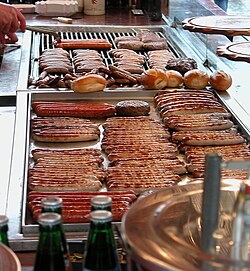Bratwurst

A variety of Bratwürste on a stand at the Hauptmarkt in Nuremberg
|
|
| Type | Sausage |
|---|---|
| Place of origin | Germany |
| Main ingredients | Meat (veal, pork or beef) |
| |
|
Bratwurst (German: [ˈbʁaːtvʊɐ̯st]) is a type of German sausage made from veal, beef, or most commonly pork. The name is derived from the Old High German Brätwurst, from brät-, finely chopped meat, and Wurst, sausage, although in modern German it is often associated with the verb braten, to pan fry or roast.
While sausage recipes can be found as early as 228 AD, the first documented evidence of the Bratwurst in Germany dates back to 1313, and can be found in the Franconian city of Nuremberg, which is still an internationally renowned center for the production of grill sausages.
Recipes for the sausage vary by region and even locality; some sources list over 40 different varieties of German bratwurst, many of the best known originating in Franconia (today for the most part situated in northern Bavaria, but still culturally quite distinct), its northern neighbour Thuringia and adjacent areas. How the sausages are served is also locally different, but most commonly they are regarded as a snack served with or in a white bread roll made from wheat flour and eaten with mustard. As a pub dish, it is often accompanied by sauerkraut or potato salad and sometimes served with dark, crusty country bread made predominantly from rye flour, less commonly with a Brezel (pretzel). It is a very popular form of fast food in German-speaking countries, often cooked and sold by street vendors from small stands.
The Franconian sausage is a relatively long (10–20 cm [3.9–7.9 in]), thick, coarse sausage, common to the whole Franconian region with slight variations. It dates back to 1313. With marjoram as a characteristic ingredient, it is close in taste to the Nürnberger Bratwurst but juicier, due to its size and coarseness. The Fränkische Bratwurst is traditionally served with sauerkraut or potato salad, but with no mustard—although many customers disregard this tradition and demand plenty of it.
...
Wikipedia
